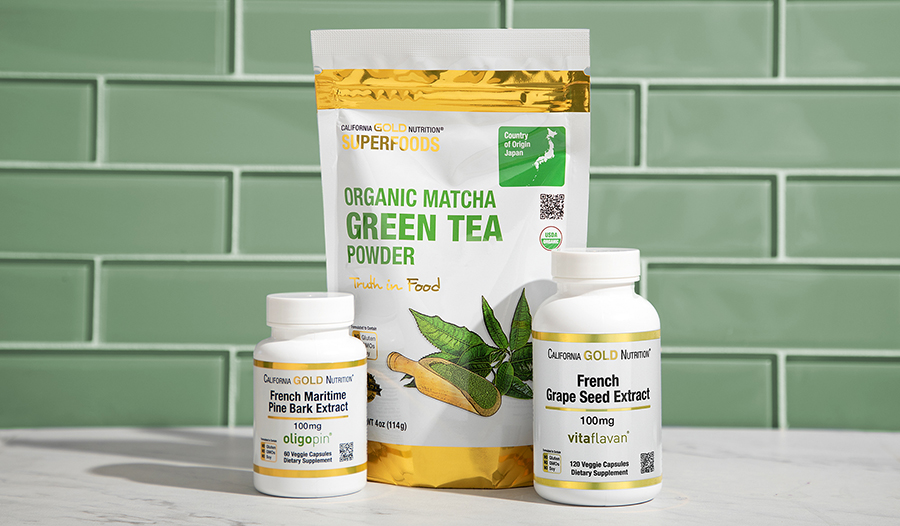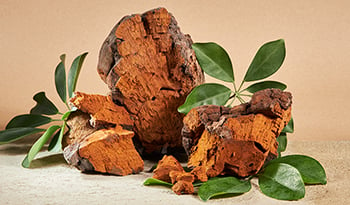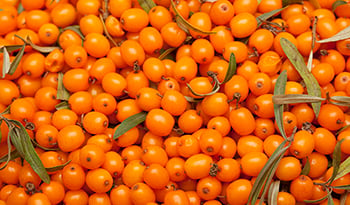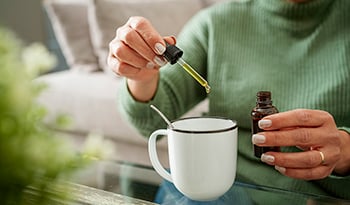3 полифенола+техните ползи: зелен чай, гроздови семки, екстракт от борова кора

Какво представляват полифенолите?
Полифенолите са широк клас естествено срещащи се съединения, открити в растенията, известни със своите антиоксидантни, противовъзпалителни и насърчаващи здравето свойства. Флавоноидите са най-голямата и най-изследвана подгрупа полифеноли, представляваща около 60% от всички полифеноли в диетата.
Екстракт от зелен чай (GTE), екстракт от гроздови семки (GSE) и екстракт от борова кора (PBE) са най-популярните екстракти от полифенол.
Ползи за здравето на полифенолите
Екстрактите от полифенол показват значителни клинични ползи за поддържане на здравето. Повечето от изследванията са фокусирани върху следните области:
- Антиоксидантни и анти-стареещи ефекти
- Здраве на очите и зрителна функция
- Фокус, внимание, когнитивна функция и здраве на мозъка
- Здраве на венците и пародонтоза
- Здраве на сърцето и съдовете, включително регулиране на кръвното налягане и здравето на артериите, вените и капилярите
- Имунна функция
- Здраве на ставите и съединителната тъкан
- Метаболитно здраве и управление на теглото
- Белите дробове, дихателните пътища и дихателната функция
- Пребиотични и микробиомни ефекти
- Здраве на кожата
Биологичните ефекти на екстрактите от зелен чай, гроздови семки и борова кора често са насочени към същите молекулярни пътища. Тези екстракти, заедно с техните мономери и метаболити, активират ключови регулатори като Nrf2 (ядрен фактор еритроиден 2-свързан фактор 2), който поддържа антиоксидантни реакции, контрол на възпалението, митохондриална функция и детоксикация. Nrf2 подобрява клетъчната защита, помага на клетките да възстановят увреждането и да регулират различни функции.
Тъй като има огромно припокриване в техните ползи за здравето, нека разгледаме някои основни общи ползи за здравето и да предоставим някои прозрения за техния сравнителен ефект.
Антиоксидантна защита и ефекти върху възпалението
Екстракт от зелен чай, екстракт от гроздови семки и екстракт от борова кора имат отлични клинично документирани ползи за подобряване на антиоксидантната защита и намаляване на кръвните маркери на възпаление.1-3 Въпреки това, екстрактът от борова кора е оценен малко по-добър при сравняване на резултатите от двойно слепи, плацебо-контролирани проучвания. Това може да се дължи на по-високите нива на нефлавоноидни полифеноли.
По отношение на възпалението, С-реактивният протеин (CRP) е кръвен маркер, който отразява степента на възпаление, която е идентифицирана като независим рисков фактор за сърдечни заболявания и други хронични здравословни проблеми. За пореден път екстрактът от борова кора показва най-голямо въздействие в тази област.4
Поддръжка на кръвното налягане
Екстрактът от зелен чай, екстрактът от гроздови семки и екстрактът от борова кора са показали положителни ефекти за подобряване на регулирането на кръвното налягане. Те постигат този ефект чрез няколко механизма:
- Антиоксидантни ефекти: Полифенолите имат антиоксидантни свойства, които намаляват оксидативния стрес, фактор, допринасящ за високото кръвно налягане.
- Ендотелна функция: Полифенолите подобряват функцията на ендотела (вътрешната лигавица на кръвоносните съдове) за подобряване на съдовото здраве.
- Подобрена съдова функция: Полифенолите насърчават подобрена съдовата еластичност и тонус.
Екстрактът от гроздови семки е най-обширно проученият от трите за регулиране на кръвното налягане, с над 20 клинични изпитвания при хора.5 При индивиди с прехипертония или лека хипертония екстрактът от гроздови семки показва значително подобрение. В 12-седмично изпитване, 400 mg/ден екстракт от гроздови семки намалява систолното кръвно налягане (SBP) с 13 mmHg и диастолното кръвно налягане (DBP) с 6,5 mmHg, с допълнителни ползи за съдовата еластичност и скоростта на пулсовата вълна. Не са наблюдавани значими ефекти при прилагане на 200 mg/ден.6 Други проучвания показват, че минималната ефективна доза е 300 mg/ден за поддържане на кръвното налягане.
Екстрактът от зелен чай и неговият ключов полифенол EGCG също са показали ползи. Мета-анализ от 2015 г. на 14 клинични изпитвания при хора установи средно намаляване на 1,42 mmHg SBP и 1,25 mmHg DBP, с по-големи ефекти при тези с повишена изходна BP.7 В по-скорошно проучване 300 mg/ден EGCG за 8 седмици при затлъстели индивиди намаляват SBP с 6,92 mmHg и DBP с 4,77 mmHg.8
Екстрактът от борова кора е оценен в поне 10 проучвания, обикновено в доза от 100—200 mg/ден, често заедно с антихипертензивни лекарства.9 Съобщава се за умерено намаляване на кръвното налягане. Въпреки това, по-ново проучване, използващо 431,5 mg полифеноли/ден в продължение на 12 седмици, показва по-силни ефекти: SBP намалява с 6,46 mmHg и DBP с 3,06 mmHg при прехипертензивни индивиди.10 Тези резултати предполагат, че по-високи дози (~ 400 mg/ден) са необходими за значими ефекти, въпреки че екстрактът от семена на гапе в същата доза остава по-ефективен като цяло.
Здраве на мозъка
Полифенолите, особено флавоноидите, определено играят роля в насърчаването на здравето на мозъка и настроението въз основа на значителни научни изследвания. По отношение на топ 3 полифенола и повишаването на настроението, екстрактът от зелен чай има най-много клинични изследвания в подкрепа на употребата му, като положителните проучвания обикновено показват най-добри резултати при по-високи дози (напр. 400 mg два пъти дневно). Екстрактът от борова кора показва някои антистресови ефекти, но нито екстрактът от борова кора, нито екстрактът от гроздови семки не са достатъчно проучени за подобряване на положителните резултати на настроението. Така че изглежда екстрактът от зелен чай оказва повече ползи в тази област на мозъчната функция.
Екстрактът от зелен чай също изглежда най-добрият избор за защита на мозъка срещу невродегенерация. Това може да се дължи на това, че EGCG може да премине кръвно-мозъчната бариера, докато проантоцианидините от екстракта от гроздови семки и екстракта от борова кора не.11
Що се отнася до засилването на психичните процеси и мозъчната функция, екстрактът от борова кора е най-клинично подкрепеният. По-специално, няколко двойно слепи проучвания показват подобрения във вниманието, зрително-двигателната координация и намален оксидативен стрес при деца с нарушения на дефицита на вниманието.12 Добавянето на екстракт от борова кора при възрастни също показва подобрения в паметта, фокуса, умствената яснота и умствените показатели при стрес.13,14
Екстрактът от гроздови семки също показва значителни ползи за повишаване на подобрената мозъчна мозъчност при здрави възрастни хора и косвено подпомага мозъчната функция, като поддържа мозъчната циркулация и микроваскуларната цялост. Но не е проучен толкова много, колкото екстрактът от зелен чай и екстракта от борова кора за мозъчни ефекти.15
Метаболитно здраве и управление на теглото
Екстрактът от зелен чай има най-клиничните изследвания, които подкрепят употребата му за метаболитно здраве и управление на теглото в сравнение с екстракта от гроздови семки и екстракта от борова кора. Десетки двойно слепи проучвания при хора показват, че екстрактът от зелен чай може да помогне за поддържане на програма за управление на теглото. В тези проучвания също е доказано, че насърчава намаления процент телесни мазнини и подобрява действието на инсулина, липидните профили в кръвта и контрола на кръвната захар. Екстрактът от зелен чай е най-ефективен, когато се комбинира с кофеин. Типичната доза в тези проучвания е била обща доза полифенол от екстракт от зелен чай от 300—600 mg/ден, с по-добри резултати, наблюдавани при 600 mg на ден.16
Както екстрактът от гроздови семки, така и екстрактът от борова кора насърчават метаболитното здраве, като подобряват действието на инсулина и контрола на кръвната захар. Те също така намаляват оксидативния стрес и възпалението, които могат да нарушат метаболитното здраве. Ефектът им върху управлението на теглото е минимален в най-добрия случай.17,18
Здраве на кожата
Всичките 3 топ полифенолни екстракта показват ползи за здравето на кожата. Екстрактът от зелен чай е най-подходящ за UV защита и намаляване на дразненето на кожата. Екстрактът от гроздови семки е най-подходящ за поддръжка на колаген, възстановяване на еластичността, намаляване на дълбочината на бръчките и поддържане на съдовите структури на кожата. Екстрактът от борова кора е най-подходящ за подобряване на тонуса на кожата и хидратацията.1-3
Крехкост на капилярите, лесно натъртване и здраве на вените
За чупливост на капилярите и лесно натъртване екстрактът от гроздови семки е най-добрият избор. За здравето на вените, както екстрактът от гроздови семки, така и екстрактът от борова кора в дози от 150 mg на ден могат да поддържат здравата структура и функция на вените. Състоянията, свързани с лоша структура и функция на вените, включват разширени вени, тежест на краката поради лоша функция на вените и хемороиди. Доказано е, че както екстрактът от гроздови семки, така и екстрактът от борова кора подобряват венозния тонус, намаляват подуването и тежестта на краката поради лоша функция на вените и подобряват притока на кръв. Екстрактът от борова кора също е доказано полезен при хемороиди и предотвратяване на венозна недостатъчност и подуване на краката, причинени от полети на дълги разстояния. Предполага се, че екстрактът от гроздови семки също би бил полезен при тези венозни проблеми. Екстрактът от зелен чай има много малко въздействие в тези области.1-3,19,20
Разликата между екстракт от зелен чай, гроздово семе и борова кора
Екстрактът от зелен чай се състои предимно от катехини, като епигалокатехин галат (EGCG). Екстрактите от гроздови семки и борова кора, от друга страна, съдържат проантоцианидини (PAC), които са вериги от епикатехинови мономери в по-малки (олигомерни) или по-големи (полимерни) форми.
И трите екстракта също съдържат полифеноли с ползи за здравето. Зеленият чай и екстрактите от гроздови семки осигуряват предимно галова киселина, а екстрактът от гроздови семки също предлага кверцетин. Екстрактът от борова кора включва дихидрокверцетин и различни фенолни киселини като кофеинова, ферулова, р-кумаринова и галова киселина.
Екстрактът от зелен чай съдържа главно свободни катехини, често свързани с галова киселина. Екстрактът от гроздови семки е богат на PACs, докато екстрактът от борова кора съдържа PACs и свободни фенолни киселини. За да се осигурят качество и ползи за здравето, тези екстракти са стандартизирани за съдържанието на полифенол:
- Екстракт от зелен чай: 50— 98% общо полифеноли и/или 30— 100% EGCG.
- Екстракт от гроздови семки: ~ 95% PACs.
- Екстракт от борова кора: 65— 75% PACs.
Ползите за здравето от тези екстракти са свързани с техните химични различия, като бионаличността е ключов фактор. Свободните флавоноидни мономери на екстракт от зелен чай се абсорбират много по-добре от PAC, които се абсорбират слабо. Въпреки това, абсорбцията може да не обясни напълно ползите за здравето на PACs. Тези съединения се метаболизират екстензивно от чревната микробиота в биоактивни фенолни метаболити с различни ефекти. Въпреки химичните различия, екстрактите от гроздови семки и борова кора произвеждат подобни микробни метаболити, което предполага сравними ефекти върху микробиома и метаболизма.
Безопасност
Както екстрактът от гроздови семки, така и екстрактът от борова кора имат отличен профил на безопасност без очаквани странични ефекти, нежелани лекарствени взаимодействия или други проблеми при препоръчителната доза. По отношение на екстракта от зелен чай са съобщени редки съобщения за чернодробна токсичност при по-високи приеми на EGCG.21 За да се избегнат проблеми с безопасността, се препоръчва дневният прием на EGCG да се поддържа под 300 mg на ден или общият прием на полифенол до по-малко от 800 mg.
Кой полифенол е най-подходящ за вас?
Разликите в химичния състав на топ 3 полифенолни екстракта произвеждат малко по-различни ползи за здравето. Има много припокриване, но като цяло един от тези три екстракта може да бъде по-добър избор въз основа на нуждите на човек. Ето някои насоки:
- Екстрактът от зелен чай може да бъде по-ефективен за клетъчната защита, особено в стомашно-чревния тракт и кръвта, както и за поддържане на кръвната захар и регулиране на теглото.
- Екстрактът от гроздови семки може да бъде по-ефективен за подпомагане на антиоксидантната защита, здравето на очите, целостта на колагена и съединителната тъкан в кожата, вените и кръвоносните съдове и помага за подобряване на регулирането на кръвното налягане.
- Екстрактът от борова кора може да окаже по-силно влияние върху противовъзпалителните пътища, когнитивната функция, здравето на ставите и здравето на ендотела (лигавицата на кръвоносните съдове).
Препратки:
- Алам М, Гулзар М, Ахтар МС и др. Епигалокатехин-3-галатен терапевтичен потенциал при човешки заболявания: молекулярни механизми и клинични проучвания. Мол Биомед. 2024 г. 27 декември; 5 (1): 73.
- Foshati S, Rouhani MH, Amani R. Ефектът от добавката на екстракт от гроздови семки върху оксидативния стрес и възпалението: Систематичен преглед и мета-анализ на контролирани изпитвания. Инт Джей Клин Практ. 2021 ноември; 75 (11): e14469.
- Dridi W, Bordenave N. Фенолни екстракти от борова кора, текущи приложения и потенциални хранителни приложения: преглед. Кър Фарм декември 2020 г.; 26 (16): 1866-1879.
- Никпаям О, Роухани М.Х., Пурмасуми М и др. Ефектът от добавката на пикногенол върху плазмената концентрация на С-реактивен протеин: систематичен преглед и мета-анализ. Clin Nutr Res. 2018 април; 7 (2): 117-125. doi: 10.7762/cnr.2018.7.2.117. Epub 2018 16 април. ПМИД: 29713620; ПМЦИД: ПМЦ5921329.
- Джан Х, Лиу С, Ли Л и др. Въздействието на лечението с екстракт от гроздови семки върху промените в кръвното налягане: мета-анализ на 16 рандомизирани контролирани проучвания. Медицина (Балтимор). 2016 август; 95 (33): e4247.
- Одаи Т, Тераучи М, Като К и др. Ефекти на екстракта от проантоцианидин от гроздови семки върху съдовата ендотелна функция при участници с прехипертония: рандомизирано, двойно сляпо, плацебо-контролирано проучване. Хранителни вещества. 2019 г. 20 ноември; 11 (12): 2844.
- Ли Г, Джан Й, Табане Л, Мбуагбау Л и др. Ефект от добавката на зелен чай върху кръвното налягане сред възрастни с наднормено тегло и затлъстяване: систематичен преглед и мета-анализ. J Хипертенс. 2015 февруари; 33 (2): 243-54.
- Чатри С, Ситихарун С, Майкаев П и др. Епигалокатехин галат намалява плазмените триглицериди, кръвното налягане и серумния киспептин при затлъстели хора. Exp Biol Med (Мейууд). 2021 януари; 246 (2): 163-176.
- Джан З, Тонг Х, Уей ЙЛ, Джао Л, Сю Джей Джей, Цин ЛК. Ефект от добавката на пикногенол върху кръвното налягане: систематичен преглед и мета-анализ. Иран J Обществено здраве. 2018 юни; 47 (6): 779-787.
- Фъргюсън JJA, Олдмедоу С, Бентли Д и др. Ефект на богата на полифенол хранителна добавка, съдържаща екстракт от кора Pinus massoniana, върху кръвното налягане при здрави възрастни: Паралелно, рандомизирано плацебо-контролирано проучване. Допълнение Тер Мед. 2022 декември; 71:102896.
- Гамаж Е, Ор Р, Травица Н и др. Полифенолите като нови интервенции за депресия: Изследване на ефикасността, механизмите на действие и последиците за бъдещи изследвания. Невросци Биобехав Рев. 2023 август; 151:105225
- Хсу CD, Хсиех ЛХ, Чен ЙЛ и др. Допълнителни ефекти на добавката на екстракт от борова кора върху невнимание, импулсивност и антиоксидантен статус при деца с разстройство на хиперактивност с дефицит на внимание: Двойно сляпо рандомизирано плацебо-контролирано кръстосано проучване. Фитотер Рес. 2021; 35 (6): 3226-3235
- Луци Р, Белкаро Г, Зули С и др. Добавката Pycnogenol® подобрява когнитивната функция, вниманието и умствените показатели при учениците. Панминерва Мед. 2011; 53 (3 допълнение 1): 75-82.
- Belcaro G, Luzzi R, Dugall M, Ippolito E, Saggino A. Pycnogenol® подобрява когнитивната функция, вниманието, умствените показатели и специфичните професионални умения при здрави специалисти на възраст 35-55 години. J Невросург Си. 2014; 58 (4): 239-248.
- Ли Б, Ченг Дж, Ченг Г, Чжу Х и др. Ефектът на екстракта от процианидини от гроздови семки върху когнитивната функция при възрастни хора с леко когнитивно увреждане: рандомизирано, двойно сляпо, плацебо-контролирано клинично изпитване. Хелион. 2023 г. 5 юни; 9 (6) :e16994.
- Ли Х, Уанг У, Хоу Л и др. Дали добавката на чаен екстракт е от полза за метаболитния синдром и затлъстяването? Систематичен преглед и мета-анализ. Клин Нутр. 2020 април; 39 (4): 1049-1058.
- Асбаги О, Назарян Б, Райнер Ж и др. Ефектите на екстракта от гроздови семки върху гликемичния контрол, серумните липопротеини, възпалението и телесното тегло: Систематичен преглед и мета-анализ на рандомизирани контролирани проучвания. Фитотер Рес. 2020 февруари; 34 (2): 239-253.
- Мохаммади С, Фулоп Т, Халил А и др. Подобрява ли добавката с екстракт от борова кора кардиометаболните рискови фактори? Систематичен преглед и мета-анализ. Допълнение на BMC Мед. 2025 г. 22 февруари; 25 (1): 71. doi: 10.1186/s12906-025-04819-9. ПМИД: 39987124; ПМЦИД: ПМЦ11847364.
- Ким С.М., Джох Дж. Х., Юнг ИМ и др. Екстракт от семена Vitis Vinifera срещу микронизирана пречистена флавоноидна фракция за пациенти с хронично венозно заболяване: рандомизирано изпитване за неинфериорност. Сург Ан Васк. 2024 декември; 109:177-186.
- Weichmann F, Rohdewald P. Pycnogenol® Екстракт от френска морска борова кора в рандомизирани, двойно-слепи, плацебо-контролирани клинични проучвания при хора. Преден номер 2024 2 май; 11:1389374.
- Hu J, Webster D, Cao J, Shao A. Безопасността на консумацията на зелен чай и екстракт от зелен чай при възрастни - Резултати от систематичен преглед. Регул Токсикол Фармакол. 2018; 95:412-433.
ОТКАЗ ОТ ОТГОВОРНОСТ:Този УЕЛНЕС ХЪБ няма за цел да поставя диагнози...

















































































 Съдържание
Съдържание















